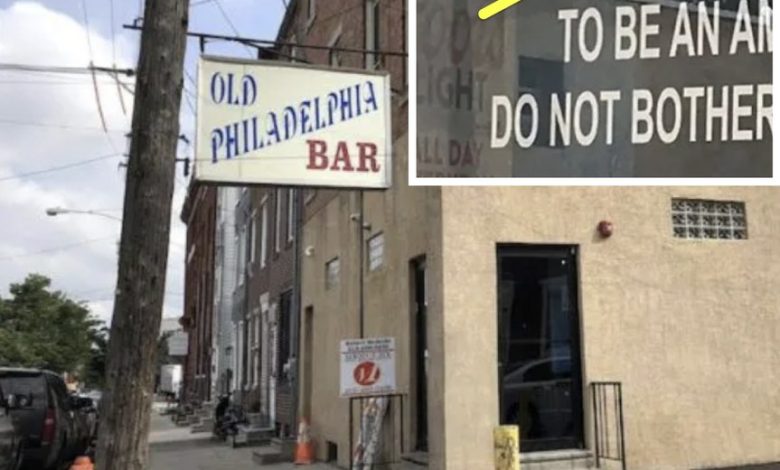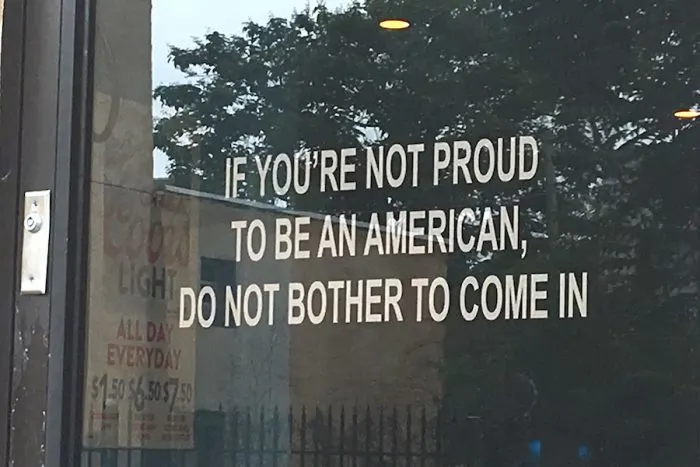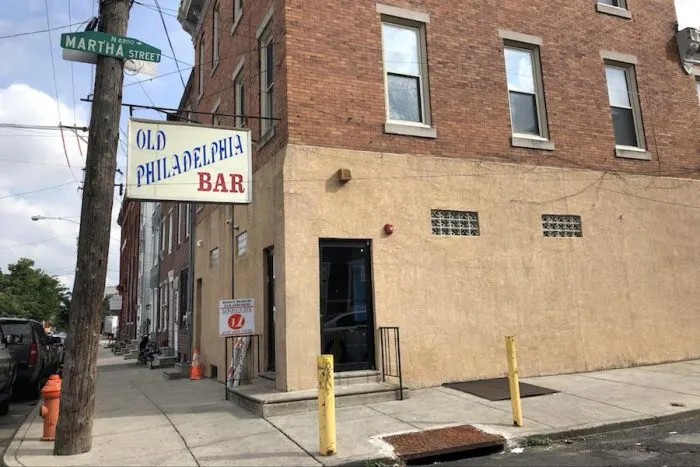Bar’s Front Door Sign ‘Sparks Outrage’, Manager Claims It’s ‘Increased Business’

Note: we are republishing this story, which originally made the news in June 2018.
ADVERTISEMENT
In June 2018, a seemingly innocuous sign on the front door of a Philadelphia bar ignited a firestorm of controversy. “If you’re not proud to be an American, do not bother to come in,” it declared, instantly transforming the “Old Philadelphia Bar” into a focal point of local debate. This seemingly simple message, however, revealed a complex tapestry of social and political anxieties simmering beneath the surface of the City of Brotherly Love.
ADVERTISEMENT
The bar, a longstanding fixture in its neighborhood, has long cultivated an atmosphere of old-school American patriotism. This is evident not just in the provocative sign, but also in the bar’s embrace of classic American traditions. Cheap domestic beers flow freely, priced at a mere $1.50 per pint, and during televised sporting events, the price drops even further to a remarkable $1. This “working-man’s” ethos, combined with the overt display of patriotism, has undeniably contributed to the bar’s unique character.
ADVERTISEMENT
However, this character, while appealing to some, has alienated others. The bar’s self-proclaimed “hipster-free” zone, with its disdain for “yuppies” and “working professionals,” has drawn criticism for its exclusionary nature. One Google review, reflecting this sentiment, bluntly stated: “Not overrun with hipster douchebags. And even if you do see some hipster douche McDouchebags, they know to keep their abject stupidity to themselves.” This statement, while perhaps intended as humorous, highlights the bar’s desire to maintain a specific social dynamic and its resistance to perceived encroachments from the changing demographics of the neighborhood.
The controversy surrounding the “If you’re not proud to be an American” sign transcended mere aesthetic preferences. It tapped into deeper anxieties about identity, inclusion, and the shifting social and political landscape of the United States. When a photo of the sign was shared on a local Facebook group, outrage ensued. Many residents expressed concern that the bar’s message was exclusionary and potentially discriminatory, particularly towards immigrants, minorities, and those who hold dissenting political views.
One woman from Fairmount, who has an Indian boyfriend with a beard, shared her apprehension about visiting the bar. “I would avoid going there,” she confided. “It’s usually fine. Sometimes, some places, it’s not fine. As is obvious from that sign.” Her statement underscores the palpable fear that some individuals experience when encountering overt displays of nationalism, particularly in environments where they may feel marginalized or unwelcome.
The bar’s management, however, remains unfazed by the criticism. As one bartender explained to a patron named Victor Fiorillo, “If you’re in this country, you should be proud to be an American.” This sentiment reflects a deeply held belief among many Americans that patriotism is not merely a matter of personal opinion, but a civic duty.
The “Old Philadelphia Bar” and its controversial sign serve as a microcosm of the broader cultural and political divisions that currently exist within American society. While some view the bar’s stance as a legitimate expression of their values and a defense against perceived cultural encroachment, others see it as a form of exclusionary nationalism that fosters an atmosphere of intolerance and division.
What are your thoughts on the sign? Do you believe it is a legitimate expression of patriotism, or does it contribute to a climate of intolerance and exclusion? Share your views in the comments section below.







